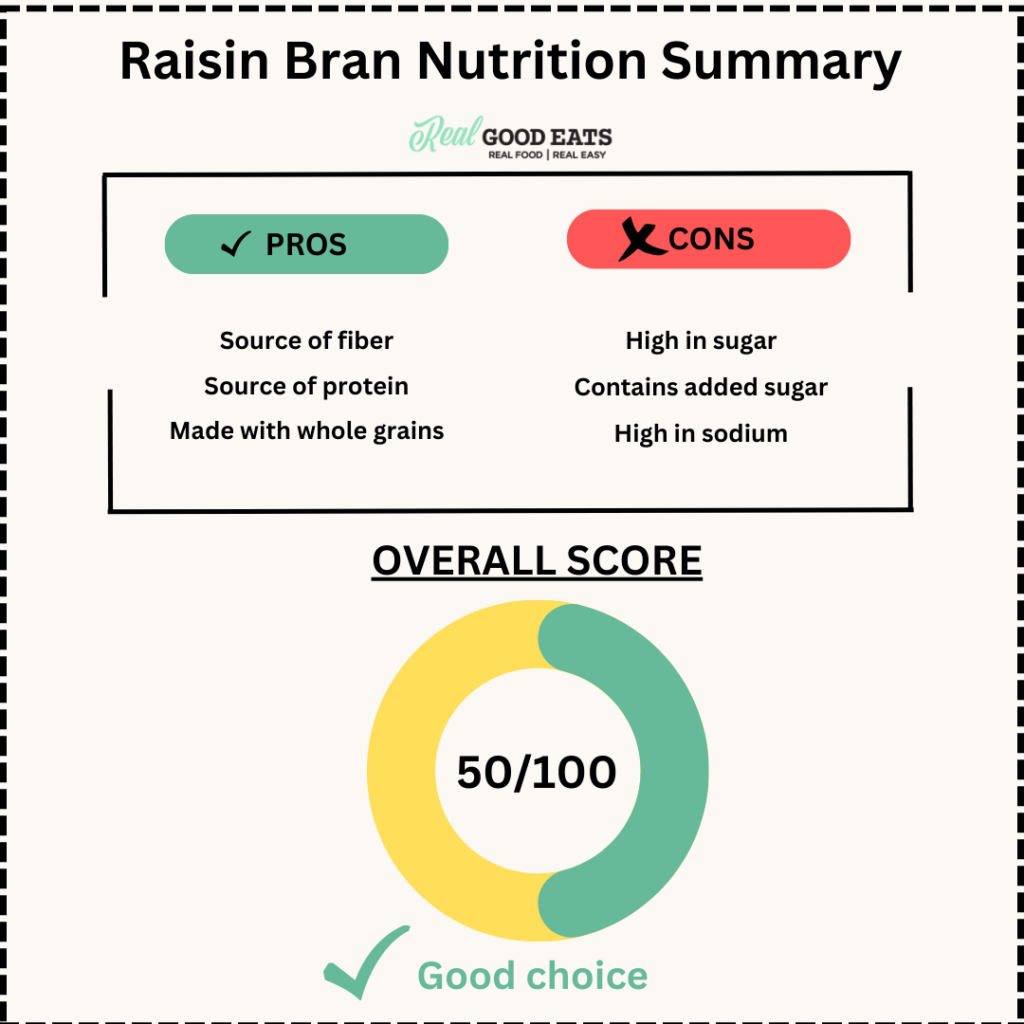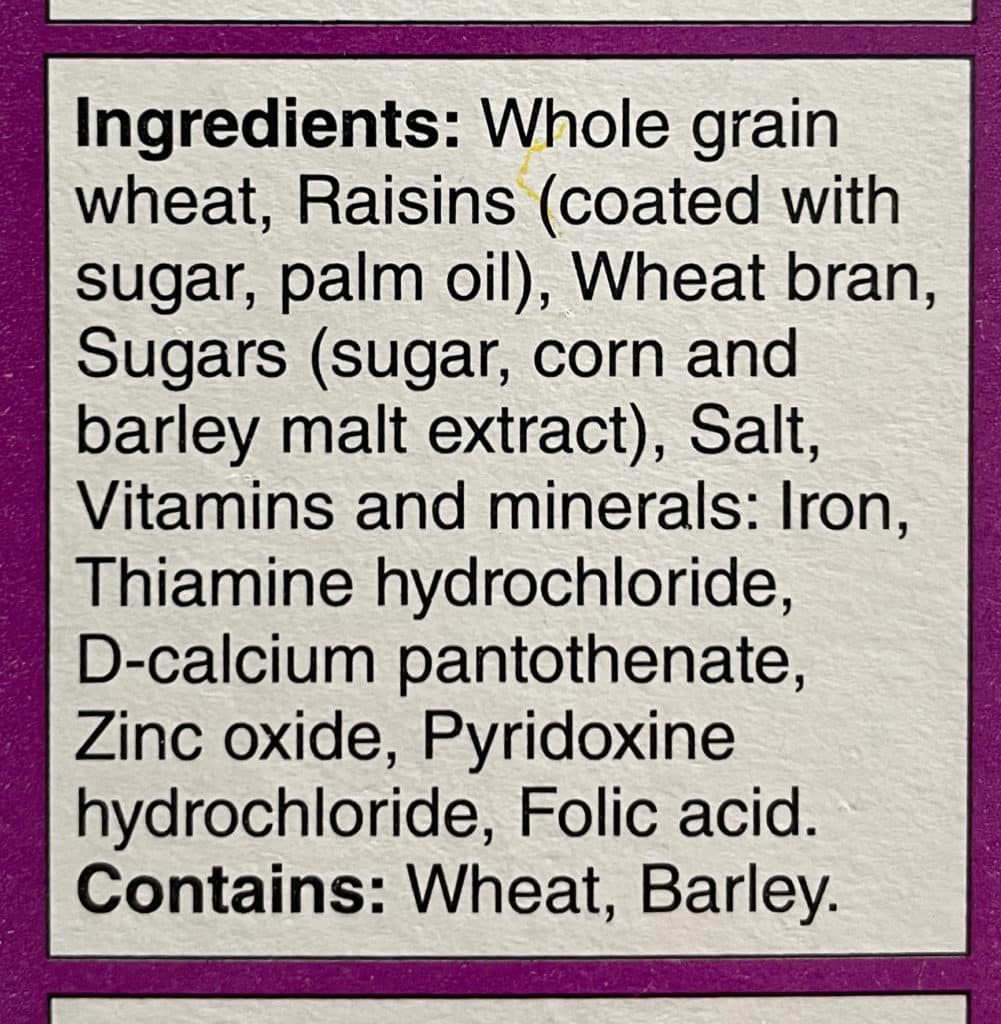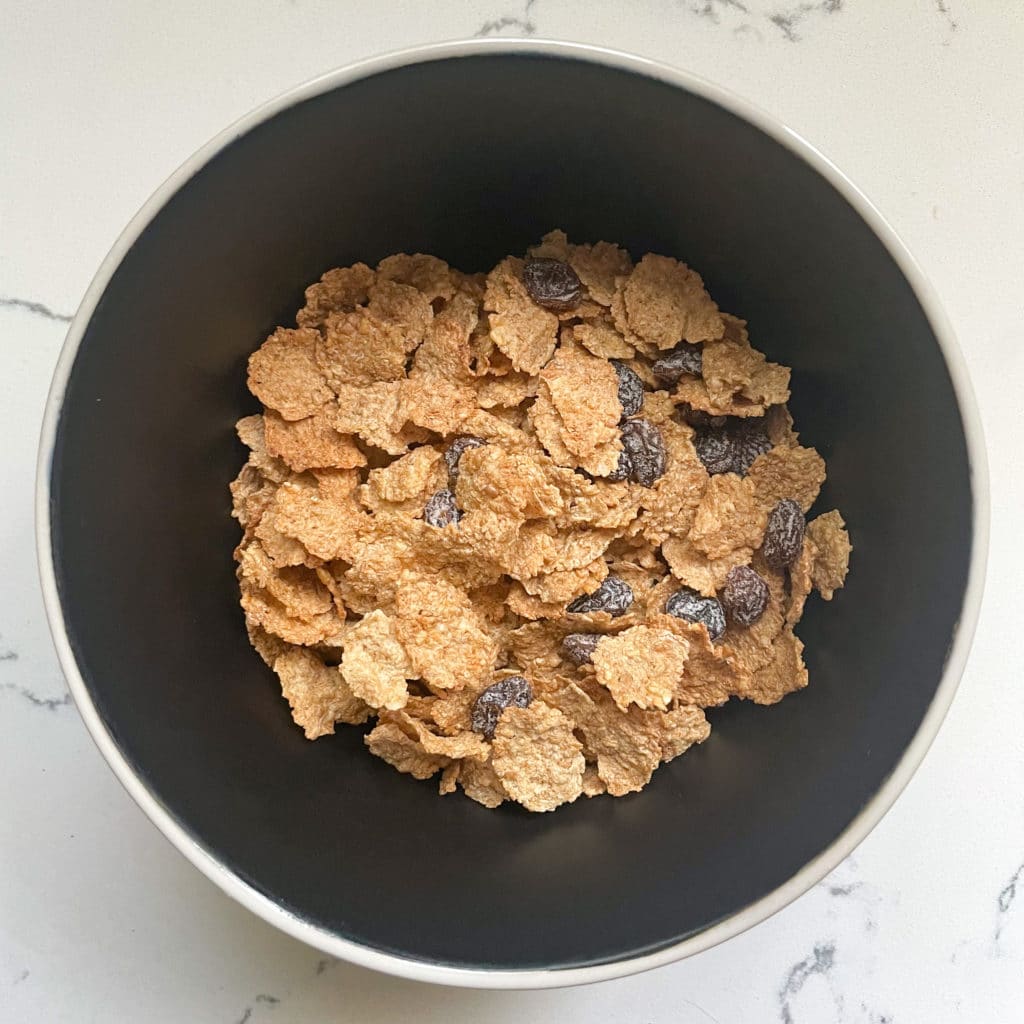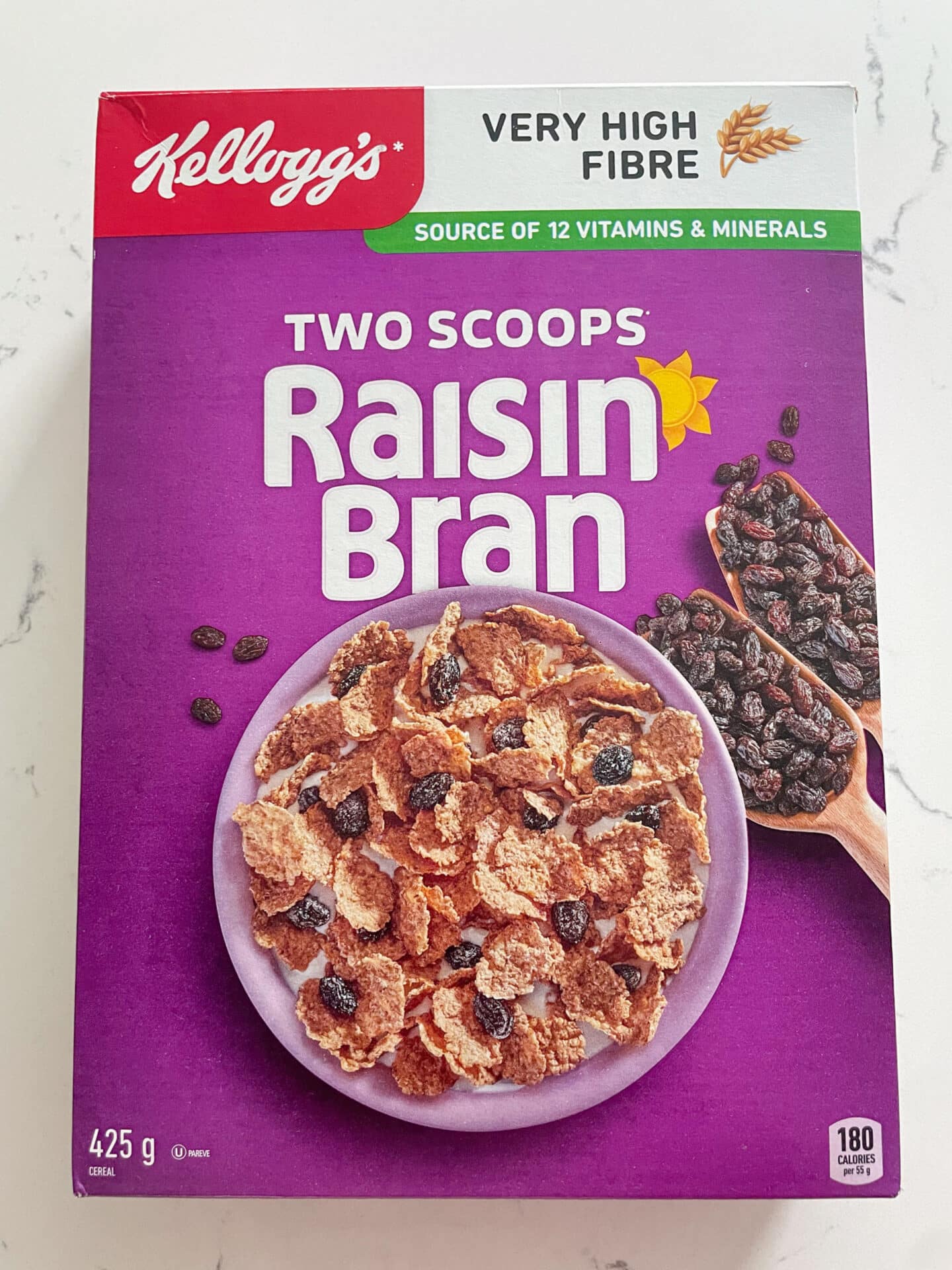Raisin Bran is a high-fibre cereal and a long-time consumer favourite. But is Raisin Bran a healthy choice? Check out our full dietitian review before adding it to your grocery cart.
Is Raisin Bran Healthy?
Raisin Bran is an excellent source of fibre from whole grains, with 7g of fibre per serving. However, Raisin Bran contains 14g of total sugar and approximately 9.5g of added sugar per serving. This is equivalent to almost 2tsp of added sugar per 1 cup of cereal. Keep in mind that most individuals consume more than 1 cup of cereal, so your actual sugar intake may be higher than this.

Read more about our Food Nutrition Score here!
Does Raisin Bran Contain Too Much Sugar?
The World Health Organization recommends consuming less than 10% of total energy from added sugars in the diet, but ideally less than 5%. In an average diet, this is equivalent to 25-50g (5-10% of total energy) of added sugar each day (1). If you don’t have many other sources of added sugar in your diet, Raisin Bran alone won’t necessarily make your diet excessive in added sugar. However, there are other cereal options that are lower in sugar that we recommend over Raisin Bran. For example, All Bran Flakes, Ezekiel 4:9 sprouted Whole Grain cereal, Kashi GOLEAN Original, and Nature’s Path Heritage Flakes. Check out our Cereal Nutrition Comparison Chart to see how Raisin Bran compares to other cereals on the market.
TL; DR: while a moderate portion of Raisin Bran cereal won’t alone make your diet excessive in added sugars, there are better options out there for high-fibre cereals without as much added sugar. Choose a lower-sugar, high-fibre cereal (such as one of the options listed above) and add your own fresh or dried fruit (with no added sugar) as this will be more satiating and reduce your added sugar intake.
Nutrition Marketing Claims
Kellogg’s promotes Raisin Bran cereal as a source of 11 essential nutrients, free of artificial flavours and colours, and a very high source of fibre (2). All of these claims are true. Raisin Bran is fortified with Iron, Thiamine, Calcium, Zinc, and B vitamins, making is a source of nutrients beyond what the cereal would naturally contain. There are no artificial flavours or colours listed in the Raisin Bran ingredient list. Lastly, Raisin Bran has 7g of fibre per 1 cup serving, making it a very high source of fibre.
Note: in order for a food product to use the nutrient claim “very high fibre” on its packaging in Canada, Health Canada guidelines state that the product must provide at least 6g of fibre per serving (3).
Taste & Texture
The flakes in Raisin Bran are crispy with a rich bran flavour. The raisins add a sweet flavour and slightly chewy texture, which pairs nicely with the crunchy flakes.

Raisin Bran Ingredients
- Whole grain wheat: the main ingredient used to create the flakes in this cereal
- Raisins (coated with sugar and palm oil): raisins are a flavour enhancer in this cereal. The raisins contain added sugar for sweetness and are coated in oil to help prevent stickiness.
- Wheat bran: an added source of fibre in the cereal. Wheat bran is a source of insoluble fibre.
- Sugars (sugar, corn, and barley malt extract): used to add flavour to the bran flakes.
- Salt: source of sodium likely used to enhance flavor and/or as a preservative.
- Vitamins/minerals:
- Iron
- Thiamine hydrochloride: thiamine or vitamin B1
- D-calcium pantothenate: B5
- Zinc oxide: zinc
- Pyridoxine hydrochloride: vitamin B6
- Folic acid: vitamin B9
Priority Allergens
Raisin Bran contains wheat and barley (gluten). Always check the label for up-to-date allergen information before consuming.

Raisin Bran Nutrition Facts
Per 1 cup serving
Calories: 180
Fat: 1g, coming from the palm oil used to coat the raisins in Raisin Bran.
Saturated Fat: 0.2g, from the palm oil.
Carbohydrates: 44g, coming from both the flakes and raisins.
Fibre: 7g, coming from the bran flakes (around 5g per serving) and to a lesser extent, the raisins (around 2g per serving).
Sugar: 14g, coming from the raisins. Below the nutrition facts table, a statement reads “approximately half of the sugars occur naturally in raisins”. This is equivalent to 1.5 tablespoons of raisins. The remaining sugar is added to the flakes and is used to coat the raisins for added sweetness.
Protein: 5g, coming from whole grain wheat.
Sodium: 250mg, coming from added salt.
Potassium: 300mg, naturally occurring from whole grain wheat (~175mg) and raisins (~125mg).
Calcium: 20mg, naturally occurring and fortified.
Other micronutrients:
Iron 7.5mg (both naturally occurring and fortified), thiamine 1.1mg (both naturally occurring and fortified), riboflavin 0.1mg (naturally occurring), niacin 3.5mg (naturally occurring), B6 0.35mg (naturally occurring and fortified), Folate 70 mcg (naturally occurring and fortified), Pantothenate (B5) 0.9mg (naturally occurring and fortified), phosphorus 200mg (naturally occurring), magnesium 70mg (naturally occurring), zinc 2mg (naturally occurring and fortified), selenium 5 mcg (naturally occurring), manganese 1.9mg (naturally occurring).
Raisin Bran vs. All Bran Flakes vs. All Bran Crunch Nutrition Facts
| Per 1 cup serving | Raisin Bran | All Bran Flakes | Raisin Bran Crunch | Raisin Bran Oats & Honey |
|---|---|---|---|---|
| Calories | 180 | 120 | 190 | 200 |
| Fat (g) | 1 | 1 | 1 | 1.5 |
| Saturated (g) | 0.2 | 0 | 0 | 0.2 |
| Carbohydrate (g) | 44 | 28 | 46 | 47 |
| Fibre (g) | 7 | 5 | 4 | 5 |
| Sugar (g) | 14 | 5 | 19 | 19 |
| Protein (g) | 5 | 4 | 4 | 4 |
| Sodium (mg) | 290 | 210 | 200 | 160 |
| Potassium (mg) | 300 | 4 | 280 | 225 |
| Calcium (mg) | 20 | 10 | 20 | 20 |
| Iron (mg) | 7.5 | 4.5 | 1 | 1.75 |
Raisin Bran vs. All Bran Flakes Nutrition
The ingredients in both cereals are identical, with the exception of the raisins (and oil/sugar coating the raisins) in Raisin Bran cereal. Adding Raising to All Bran Flakes results in a higher calorie and carbohydrate content of Raisin Bran compared to All Bran Flakes. One cup of Raisin Bran has an additional 60 calories than All Bran Flakes. These calories are due to the carbohydrates in the raisins. Compared to All Bran Flakes, Raisin Bran contains an additional 14g of carbohydrates, including one additional gram of fibre and 9 additional grams of sugar per serving. Of the additional sugar, approximately 4.5g is naturally occurring in raisins, and the remaining 4.5g is added as a coating to the raisins.
Raisin Bran contains 1g of additional protein per serving compared to All Bran Flakes. The micronutrient content of Raisin Bran is also different than All Bran Flakes, largely due to the added nutrients naturally present in raisins. Raisin Bran contains almost double the amount of potassium compared to All Bran Flakes, significantly more iron, and slightly higher levels of calcium, iron, B vitamins, magnesium, zinc, selenium, and manganese.
If choosing between these two types of cereal, we recommend All Bran Flakes as the better option.
Raisin Bran vs. Raisin Bran Crunch Nutrition
Compared to All Bran Crunch, Raisin Bran is lower in calories, with 190 and 160 calories per serving, respectively. The carbohydrate content of Raisin Bran and Raisin Bran Crunch is similar, however, Raisin Bran contains 7g of fibre and 14g of sugar per serving, while Raisin Bran Crunch contains 4g of fibre and 19g of sugar per serving. An estimated 9.5g of the sugar in Raisin Bran is added sugar, compared to 13g of added sugar in Raisin Bran Crunch. There is not a significant difference in the micronutrient content of Raisin Bran compared to Raisin Bran Crunch.
If choosing between these two types of cereal, we suggest Raisin Bran Original as the better option as it is lower in sugar than Raisin Bran Crunch.
Raisin Bran vs. Raisin Bran Honey & Oats Nutrition
Compared to Raisin Bran Honey & Oats, Raisin Bran Original is lower in calories, with 200 and 180 calories per serving, respectively. The carbohydrate content of Raisin Bran and Raisin Bran Honey & Oats is similar, however, Raisin Bran contains 7g of fibre and 14g of sugar per serving, while Raisin Bran Crunch contains 5g of fibre and 19g of sugar per serving. Raisin Bran is much higher in sodium, potassium and iron compared to Raisin Bran Oats & Honey.
If choosing between these two types of cereal, we suggest Raisin Bran Original as the better option as it is lower in sugar than Raisin Bran Oats & Honey.
Check out our Cereal Nutrition Comparison Chart to see how Raisin Bran compares to other cereals on the market.
Cost
Raisin Bran is available in Ontario for $4.97-$6.99 per 425g box at the time of this review.

Frequently Asked Questions
Is Raisin Bran Good for Weight Loss?
Raisin Bran is an excellent source of fibre which can increase the feeling of fullness at meals and help with weight loss goals. However, it contains 14g of sugar per serving which is higher than other high-fibre cereals on the market. We suggest choosing a high-fibre cereal with less added sugar to support your health and weight goals.
Is Raisin Bran Healthy for Diabetes?
It is recommended that people with diabetes consume lower glycemic foods more often (5). Both All Bran Flakes and raisins are considered medium glycemic index (4). Raisin Bran cereal also contains 9.5g of added sugar per serving which increases the glycemic index of the cereal. If you choose to eat cereal, we suggest a high-fibre option with less added sugar, paired with a protein and healthy fat source to reduce the glycemic load.
Note: a person’s blood sugar response to a meal will vary depending on many factors. Always speak with your dietitian or healthcare team for individualized advice based on your specific needs.
Is Raisin Bran Heart Healthy?
Raisin Bran is high in fibre, an important nutrient for heart health. However, we suggest choosing a high-fibre cereal with lower sugar for an all-around healthier option.
Is Raisin Bran a Healthy Breakfast?
Raisin Bran is an excellent source of fibre but lacks other nutrients needed for a balanced breakfast. If you choose to consume Raisin Bran for breakfast, we suggest pairing it with a source of protein and healthy fats for a balanced meal.
Does Raisin Bran have Fibre?
Anything with more than 6g of fibre per serving is considered an excellent source of fibre. Raisin Bran contains 7g of fibre per 1 cup serving, making it an excellent source. The fibre content of cereal types ranges from 0-23g per serving. Compared to other cereals, Raisin Bran is moderate in fibre. Check out our Comprehensive Cereal Nutrition Comparison Chart here for more details on how Raisin Bran measures up to your favourite cereal.
What is a serving size of Raisin Bran?
A serving of Raisin Bran is equivalent to 1 cup of dry cereal, or 55g of cereal by weight.
How much protein is in Raisin Bran?
Raisin Bran contains 5g of protein per 1 cup serving. This is a moderate amount of protein compared to other cereals on the market, which range from 0-20g of protein per serving.
How much sugar is in Raisin Bran?
Raisin Bran contains 14g of total sugar per 1 cup serving, with approximately 4.5g of this sugar naturally occurring in raisins.
Is Raisin Bran high in sugar?
Raisin Bran contains 14g of total sugar per 1 cup serving, with approximately 4.5g of this sugar naturally occurring in raisins. This is high compared to other high-fibre cereals on the market. Review our Cereal Nutrition Facts Comparison Chart here for details on how Raisin Bran compares to other cereal brands.
Is Raisin Bran Gluten-Free?
Raisin Bran contains wheat and barley and is not Gluten-Free.
Is Raisin Bran Keto Friendly?
Raisin Bran contains 37g of net carbohydrates per serving and is not considered keto.
Is Raisin Bran low glycemic?
No, both All Bran Flakes and Raisins are considered medium glycemic (4). There is also added sugar in Raisin Bran that would be considered high glycemic.
Raisin Bran Calories
One cup of Raisin Bran has 180 calories.
Raisin Bran Sugar
There is 14g of sugar per 1 cup serving of Raisin Bran.
Raisin Bran Carbs
One cup of Raisin Bran has 44g of carbohydrates.
Related Posts:
- Is Magic Spoon Cereal Healthy? Dietitian Review
- Are Cheerios Healthy? Dietitian Review
- 17 Best High Fiber Low Sugar Cereal
Sources:
- Guideline: Sugar Intake for Adults and Children, World Health Organization (2015).
- Kellogg’s Products, Two Scoops Raisin Bran Cereal (accessed June 7, 2023)
- Nutrient Content Claims: What They Mean, Health Canada (accessed June 7, 2023)
- GI Search: All Bran Flakes; GI Search: Raisins, Glycemic Index Research and GI News, The University of Sydney (accessed June 8, 2023).
- Glycemic Index Education Portal, Diabetes Canada (accessed June 8, 2023).


